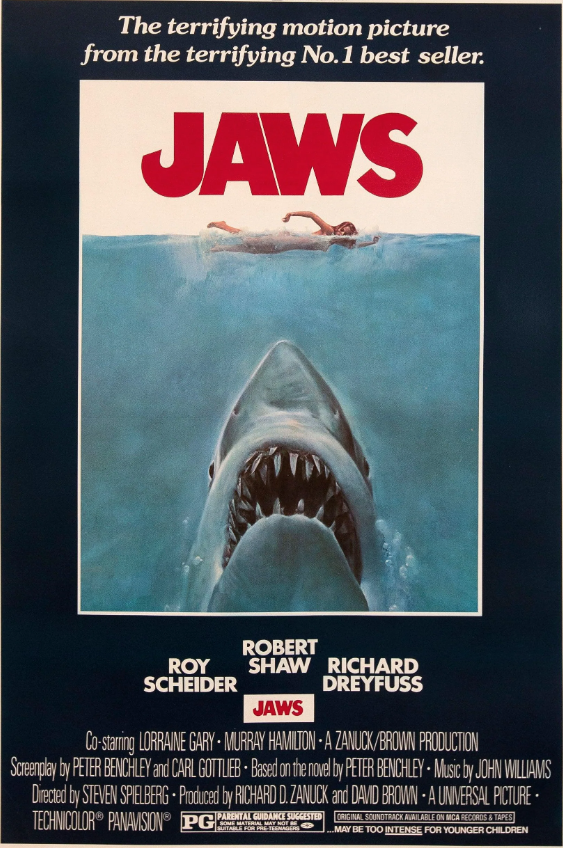Blockbuster book and film spawned an industry, and an unwitting backlash that killed sharks.
Today, a new ethos is developing to see, understand, and save sharks from exploitation and extinction.
The 1975 film Jaws had a significant impact on the public perception of sharks, much of it negative. The film depicted a rogue great white shark as a ferocious and mindless man-eater, and this portrayal has persisted in popular culture to this day. The film’s depiction of sharks as fearsome predators that attack humans for no apparent reason led to a widespread fear of sharks, and many people believe still that all sharks are dangerous to humans. In California, the film led to vendetta killings, great white shark tournaments, a commercial fishery that along with bycatch in a gillnet fishery, almost completely wiped out the population of white sharks along the west coast of North America.
It’s significant to note that the negative portrayal of sharks in “Jaws” has had real-world consequences. Sports fishermen catch and display sharks without regard to cruelty. Coastal ocean goers ignorant about true shark behavior and relative risk are overly fearful of sharks, and this perception can generate overly-reactive public policy in the event of a (rare) attack on a human. The general attitude about sharks has led from a general disregard and mismanagement of sharks in fisheries to an outright vilification of these apex predators. For example, shark fisheries and finning have become major issues facing shark populations globally, and as a result, many shark species are facing huge population declines with little public attention. Additionally, the negative perception of sharks has made it difficult for conservation efforts to gain traction in some areas, as many people are reluctant to support measures to protect these important animals.
Early on, when asked if he had regrets for making Jaws, Stephen Spielberg said that Jaws was a challenging film to make, especially with the 25-foot mechanical shark “Bruce” used throughout the film as a major character. He considers it one of his most personal and successful films, recognizing the signature score by John Williams played a significant role in creating the suspense and tension in the movie.
“You will never go into the water again.”
Pithy catchlines such as these, along with William’s ominous score played on an innate fear of wild animals for many people, resulting in irrational fears and often generating human behavior dangerous for sharks.
Over 500 species of sharks are not dangerous to humans, and only a few species have been involved in serious or fatal attacks on humans. In fact, many species of sharks are endangered, with over 70% of all sharks and rays fished out, yet they play a crucial role in maintaining healthy ocean ecosystems.

For many reasons Jaws is a great film with excellent screenwriting, brilliant drama and a cast that helped us feel the fear, but most people don’t see the fictional and even comically unrealistic behavior of the mechanical shark, and instead focus on the fear factor generated by Spielberg and the cast. Not long after the movie, Peter Benchley the author if the best-selling novel from which the script was derived, lamented the depiction of sharks, and the backlash on sharks generated by his book and the subsequent movie. Benchley spent the rest of his career writing novels depicting sharks in a more favorable role, and actively working to protect sharks with his wife Wendy Benchley. However, it took close to five decades before Spielberg finally admitted he can’t help but feel a little responsible for the negative stereotype that Jaws inspired.
The success of the film spawned several sequels and an entire industry and television programming including Discovery Channel’s Shark Week episodes, and National Geographic’s Shark Fest.

Addressing the genre of shark -horror films, a new film produced by Stephen Scarlata called Sharksploitation, documents the history and examples of shark thrillers generated by Jaws.
Jaws is not the only Menace
Since 1970, the abundance of oceanic sharks and rays has declined by more than 70% as a result of an 18-fold increase in fishing pressure, according to a Nature study conducted in 2022. As a result of the depletion, the risk for global extinction now impacts three-quarters of shark and ray species.
Our irrational fear of sharks, a general disconnection from them and the man eating myth generated by media attention whenever a shark attack occurs has not helped protect sharks. Although Jaws might have inspired a negative attitude towards white sharks in particular, and all sharks in general, we cant hold Spielberg entirely responsible.
Twenty-one years after publication and not long before his death in 2006, Peter Benchley, the author of Jaws reminisced:
“I couldn’t write Jaws today. The extensive new knowledge of sharks would make it impossible for me to create, in good conscience, a villain of the magnitude and malignity of the original.”
In 2022 Spielberg followed Benchley’s lead. “That’s one of the things I still fear. Not to get eaten by a shark, but that sharks are somehow mad at me for the feeding frenzy of crazy sport fishermen that happened after 1975,” the celebrated filmmaker stated during a December 2022 interview on the BBC’s Island Discs program. “To this day, I regret the decimation of the shark population because of the book and the film. I really, truly regret that.”
Although “Jaws” was a highly successful film and generated an entire sub-genre, its portrayal of sharks as dangerous man-eaters is far from reality, and it has had a lasting impact on public perception of these fascinating and important animals. However, like Peter Benchley, Spielberg’s celebrity voice can make a dramatic impact on people’s views for sharks in a positive light.
Don’t Fear the Shark, Fear For Them
A new social media trend has developed with filmmakers and photographers seeking sharks and depicting them as the beautiful animals they are. Decades after the book and film, passionate shark conservation groups like Shark Stewards are educating the public to not fear sharks, but fear for them, and work to protect them from extinction.
Keep sharks Swimming, and these stories Free With Your Donation.
By David McGuire, ©2023 Shark Stewards